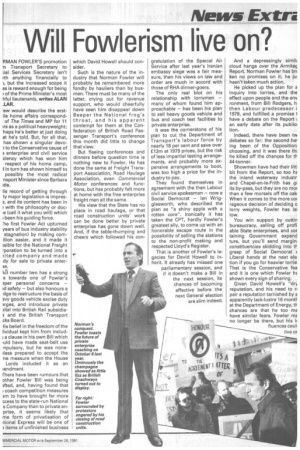RMAN FOWLER'S promotion Ti Transport Secretary to iaI Services Secretary
Page 15

If you've noticed an error in this article please click here to report it so we can fix it.
isn't rth anything financially to 1, but the increased scope it es is reward enough for being of the Prime Minister's most hful lieutenants, writes ALAN .LAR.
'ew would describe the erstIle home affairs correspondof The Times and MP for 11 irs as a political heavyweight; haps he's better at just doing at he's told. But, for all that, has shown a singular devoto the Conservative cause of 3 enterprise and civil service ciency which has won him respect of his home camp, lin turn has shown himself to possibly the most radical nsport Minister since Barbara
(is record of getting through ly major legislation is impresa, and its content has been in with the philosophy or docle (call it what you will) which ; been his guiding force.
'he first Fowler Act upturned years of bus industry stability stagnation) by making cornition easier, and it made it ;sible for the National Freight aporation to be turned into a iited company and made dy for sale to private entere.
ka number two has a strong s towards one of Fowler's 3per personal concerns — id safety — but also honours a dge to restructure the basis of 3vy goods vehicle excise duty 3rges, and introduce private aital into British Rail subsidia3 and the British Transport cks Board.
us belief in the freedom of the lividual kept him from includa clause in his own Bill which
;uld have made seat-belt use -npulsory, but he was none ;less prepared to accept the -ne measure when the House Lords included it as an iendment, (-here have been rumours that other Fowler Bill was being
3fted, and, having found that ; coach competition measures am to have brought far more ccess to the state-run National s Company than to private enprise, it seems likely that me form of privatisation of titan& Express will be one of 3. items of unfinished business which David Howell should consider.
Such is the nature of the industry that Norman Fowler will probably be remembered more fondly by hauliers than by busmen. There must be many of the latter, crying out for revenue support, who would cheerfully have seen him disappear down Beeper the National frog's throat, and his apparent contempt for them at the Confederation of British Road Passenger Transport's conference this month did little to change that view.
But fleeing conferences and dinners before question time is nothing new to Fowler. He has done the same at Freight Transport Association, Road Haulage Association, even Commercial Motor conferences and functions, but has probably felt more at home with the free enterprise freight men all the same.
His view that the State has no place in road haulage, or that road construction units' work can be done better by private enterprise has gone down well. And, if the table-thumping and cheers which followed his con gratulation of the Special Air Service after last year's Iranian embassy siege was a fair measure, then his views on law and order are much in accord with those of RHA dinner-goers.
The only real blot on his relationship with lorrymen — many of whom found him approachable — has been his plan to sell heavy goods vehicle and bus and coach test facilities to private enterprise. It was the cornerstone of his plan to cut the Department of Transport's labour force by nearly 18 per cent and save over £13m at 1979 prices, but the risk of less impartial testing arrangements, and probably more expensive arrangements to boot, was too high a price for the industry to pay.
They found themselves in agreement with the then Labour civil service spokesman — now a Social Democrat — Ian Wrigglesworth, who described the plan as "a shiny apple with a rotten core". Ironically it has taken the CPT, hardly Fowler's greatest ally, to come up with an honorable escape route in the possibility of selling the stations to the non-profit making and respected Lloyd's Register.
That is another of Fowler's legacies for David Howell to inherit. It already has missed one parliamentary session, and if it doesn't make a Bill in the next session, its chances of becoming effective before the next General election are slim indeed. And a depressingly simili cloud hangs over the Armitag Report, Norman Fowler has brc ken no promises on it; he ju: hasn't taken much action.
He picked up the plan for a inquiry into lorries, and the effect upon people and the env ronment, from Bill Rodgers, h then Labour predecessor i 1979, and fulfilled a promise I have a debate on the Report s an early date after its publics tion.
Indeed, there have been tw debates so far: the second hal ing been of the Opposition choosing, and it was there ths he killed off the chances for tF 44-tanner.
Showmen have had their littl bit from the Report, so too hE the inland waterway industr and Chapel-en-le-Frith has gt its by-pass, but they are no mot than a few morsels off the cak. When it comes to the more cot rageous decision of deciding o lorry weights, Fowler has lai low.
You win support by cuttin bureaucracy, selling off profi able State enterprises, and cor taming Government expend ture, but you'll send margin. constituencies skidding into ti' grasp of Social Democrat Liberal hands at the next ele. tion if you go for heavier lorrie That is the Conservative fea and it is one which Fowler hz shown every sign of sharing.
Given David Howell's "cir,. reputation, and his need to n pair a reputation tarnished by a apparently lack-lustre 16 montiat the Department of Energy, ft chances are that he too rnE have similar fears. Fowler rnE no longer be there, but his it fluences coul,
live or












































